UNHCR study shows rapid deterioration in living conditions of Syrian refugees in Jordan
UN High Commissioner for Refugees António Guterres says large numbers of Syrian refugees are sliding into abject poverty, and at an alarming rate, due to the magnitude of the crisis and insufficient support from the international community.
He made the statement at the launch of a new UNHCR study, Living in the Shadows, which reveals evidence of a deepening humanitarian crisis. High Commissioner Guterres is on a two-day visit to Jordan, where he will meet refugees profiled in the study in Amman and others at the Za’atari refugee camp.
“I am here to express my solidarity with Syrian refugees, as the impact of snowstorm Huda is still tangible and posing an even greater strain on their already dire living conditions.” Guterres is also meeting with Jordanian officials and with donors to coordinate efforts to improve living conditions for Syrian refugees and support the communities hosting them.
Conducted by UNHCR and International Relief and Development (IRD) the study is based on data from home visits with almost 150,000 Syrian refugees living outside of camps in Jordan in 2014.
According to the study, two-thirds of refugees across Jordan are now living below the national poverty line, and one in six Syrian refugee households is in abject poverty, with less than $40 per person per month to make ends meet.
Almost half of the households researchers visited had no heating, a quarter had unreliable electricity, and 20 per cent had no functioning toilet. Rental costs accounted for more than half of household expenditures, and refugee families were increasingly being forced to share accommodations with others to reduce costs.
“Unless the international community increases its support to refugees, families will opt for ever more drastic coping strategies,” Guterres said. “More children will drop out of school to work and more women will be at risk of exploitation, including survival sex.”
As the Syrian conflict approaches its fifth year, many refugees are becoming increasingly dependent on assistance. Jordan’s resources and infrastructure, too, have been stretched to the limit.
In an effort to address this critical situation, UNHCR is providing monthly cash assistance to 21,000 of the most vulnerable Syrian families, or 14 per cent of the Syrian refugee population living outside camps. As of the end of 2014, over 10,000 additional Syrian refugee households have been identified as eligible for such assistance but, due to lack of funds, cannot be provided with support.
Overall, the report’s findings make it clear that any further reductions in the current levels of support will have immediate and serious consequences for Syrian refugees in Jordan. The situation is particularly worrying for the most vulnerable populations, such as female-headed households and elderly refugees.
Guterres emphasized that this crisis can be mitigated if the international community steps up efforts to alleviate the suffering of the refugees. He praised the efforts of the Jordanian authorities, UNHCR and its partners to address the urgent needs of refugees during last week’s heavy snowstorm.
In total, Jordan has a registered Syrian refugee population of 620,000, some 84 per cent of whom live outside camps.
“This represents a dramatic pressure in the economy and the society of the country not to mention the terrible security impact of the Syria crisis in itself,” Guterres said.
“The generosity of the Jordanian people and the Government needs to be matched by massive support from the international community – support for the refugees themselves and for the local populations hosting them, but also structural and budgetary support to the Jordanian Government for education, health, water and sanitation and electricity to enable it to cope with this enormous challenge.”
Additional Information:
– The “Living in the Shadows” report is available on our media page at: http://unhcr.org/jordan2014urbanreport/.
Page 2 of 26
-

Refugee Week Greece – “Our Home”
31 May 2024Refugee Week Greece returns for its third year to celebrate the resilience, diversity and creativity of individuals who have experienced forced displacement, coinciding with World Refugee Day on June 20th. Through a week-long program of diverse events and workshops, we aim to foster a deeper understanding of the challenges faced […]
-

“We are all together in the race for life”
24 May 2024UNHCR announces winners of National Student Contest on the power of sports
-

Refugee integration: How refugees can help businesses grow
16 May 2024Joint press release
-
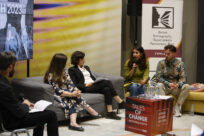
Racist Violence Recording Network – From Hate Speech to Racist Attacks: Patterns of Racist Violence in Greece, 2023
23 Apr 2024A wide geographical dispersion of racist violence incidents, attacks displaying signs of orchestration, unfolding amidst a concerning backdrop of escalating hate speech in the public sphere, intense and continuous racist violence at the country’s borders, notably targeting refugees and migrants, systematic racist behaviour by representatives of the State, as well […]
-
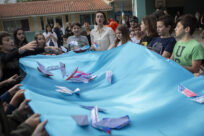
“Together!” student art festivals present in cities around Greece the world as children want it to be
29 Mar 2024Joint Press Release UNHCR/TENet
-
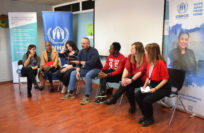
More than 230 jobs offered to refugees and asylum-seekers during a job fair in Thessaloniki
20 Mar 2024A job fair organized on 13 March by SolidarityNow and UNHCR, the UN Refugee Agency, in Thessaloniki, wrapped up successfully with more than 230 jobs offered so far after some 770 interviews. The event aimed to connect refugees and asylum-seekers in search of work opportunities, with employers from various companies […]
-

Attack in Thessaloniki: yet another violent incident targeting people because of their identity
15 Mar 2024Athens 15.03.2024 – The Racist Violence Recording Network strongly condemns the violent incident against two LGBTQI+ individuals in Thessaloniki by a large group on Saturday 9 March 2024 and expresses its deep concern about the escalating homophobic and transphobic rhetoric targeting LGBTQI+ people and the impact it might have on […]
-
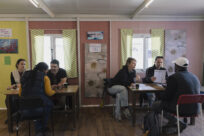
Fostering integration early on: Successful conclusion of largest job fair for refugees and asylum-seekers on Lesvos
1 Mar 2024More than 450 participations from refugees and asylum-seekers, along with some 30 employers from various parts of Greece, were recorded in a well-attended job fair held on 27 and 28 February in Lesvos’ Closed Controlled Access Centre (CCAC). Either with physical or online presence, employers showed keen interest in interviewing prospective […]
-
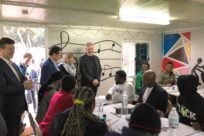
UN High Commissioner for Refugees wraps up visit to Greece: welcomes progress on integration and urges continued efforts
22 Feb 2024Following a two-day visit to Athens, Greece, the UN High Commissioner for Refugees Filippo Grandi reaffirmed the commitment of UNHCR, the UN Refugee Agency, to continue working together with the Greek authorities, civil society organizations and refugee communities, in providing protection and solutions to people forced to flee. During his […]
-
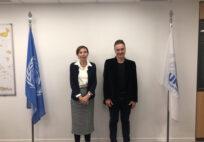
A new cycle of cooperation begins between the Municipality of Athens and UNHCR
8 Feb 2024The new Vice-Mayor of the Municipality of Athens for the social integration of migrants and refugees, Mr. Thanasis Chimonas, met, on Friday 19 January 2024, the Representative of UNHCR in Greece, Ms. Maria Clara Martin, launching a new cycle of cooperation between the new municipal authority and the international organization. […]
